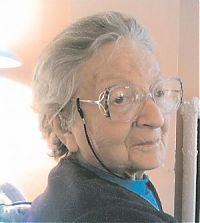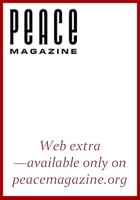Hanna Newcombe (1922-2011)
 Hanna Newcombe, Peace Researcher
Hanna Newcombe, Peace Researcher
Hanna Newcombe was one cool babe. Yes, to be sure, it was possible to spend days with her in a group without noticing how remarkable she was. You might suppose she was a quiet, clueless little old lady who had wandered into the room by mistake. Instead, she was probably the smartest and wisest woman I’ve ever known. On April 10, 2011 she died at age 89 after living for several years in a Hamilton, Ontario nursing home.
Though Hanna never tried to impress anyone, others did eventually recognize her exceptional insights, and conferred on her the Order of Canada. Belatedly, I want to be her PR agent by suggesting that you read some of her amazing essays, all of which are available on her web site— at hannanewcombe.com —to discover the breadth of her interests and the depth of her knowledge. (Remember, she spelled her name “Hanna,” not “Hannah.”) She was a scientist of vast curiosity and a speculative, integrative turn of mind. Thus the essays that she titled “How Things Come Together,” mainly reveal her notions concerning (as she described them):
- “Time as a dimension of Space.
- A limited number of interrelated Essences.
- The importance of only some being conserved.
- The ‘windmill’ model of the road to truth.
- The Mind as a room with many doors.
- The new science-based religion.
- The origin and nature of Life.
- Patterns: levels, rhythms, cycles, passages, bifurcations, mandalas.
- The Great Wrap-around: God as Created and Creator.”
Hanna was born Jewish in Czechoslovakia but was brought to Canada as a girl by parents who were fleeing from the Holocaust. Farming was a condition of getting a Canadian visa, so Hanna’s father bought a fruit orchard and, during her high school years, she picked a lot of fruit. Probably her childhood memories of the war explain her commitment to peace. (Although she was serene and gentle in daily life, I once shared a hotel room with her and was repeatedly awakened by her groans of anguish while she slept.)
She studied chemistry at McMaster University, earning a Ph.D. and meeting another chemistry student there, Alan Newcombe. Over the objections of both sets of parents, they married and transcended their religious diversity by becoming Quakers. They had three children, two of whom—George and Nora—are professors in the US today, while their lawyer son Ian lived near enough to monitor Hanna’s wellbeing after his father died twenty years ago.
While the children were small, Hanna was a full-time homemaker in Dundas, Ontario, while Alan held a professional job as a chemist. Their big turning point came when they met Norman and Pat Alcock, who were pioneering a new professional field called peace research. The Newcombes joined forces with them in their new Canadian Peace Research Institute, which published several journals. This decision meant that the Newcombe family’s annual income dropped immediately to $3,000, but they lived simply and persevered in this new career for the rest of their lives. In 1975 the Alcocks moved to Huntsville, Ontario and closed their institute, but Alan and Hanna turned the basement of their own brick bungalow into a similar project, called the Peace Research Institute-Dundas, which would continue until 2004. Lots of local peace activists volunteered to work in that basement and all around the world there were researchers taking notes on every available paper for Hanna’s journal of abstracts.
One of Alan’s projects, with daughter Nora, was the development of a “tensiometer,” a set of indicators that predicted the outbreak of war on the basis of arms buildups. They showed that, contrary to the Roman maxim “If you want peace, prepare for war,” preparations for war generally resulted in war. “If you want peace, prepare for peace,” he advised.
Alan kept up his work as long as possible, despite his growing disability from Parkinsonism. After his death, Hanna hardly paused. She often took long, grueling bus trips across the continent to peace conferences, where she would sit taking thorough notes on five-by-eight cards for her journal of abstracts. Still, eventually she too had to turn the work over to others. Her library and collection of papers had been shipped off to Sweden when I visited her in her Dundas home for the last time before she moved into a retirement place. I interviewed her then and published our conversation in Peace Magazine, “Hanna Newcombe: Pioneering in Peace Research.” http://peacemagazine.org/archive/v21n1p08.htm.
Only during that visit did I get to see the brilliant essays she had been writing over the years and filing in a drawer somewhere. She didn’t have them on disk; there were only paper copies filling several legal-sized folders. How wonderful they were! She let me take them home. Now I want to share them with you on the Internet.
I have a fantasy—that a smart girl somewhere on this planet will discover that web page, read it, and decide: “I want to be just like Hanna when I grow up.”
Thanks, Hanna. You did well.
